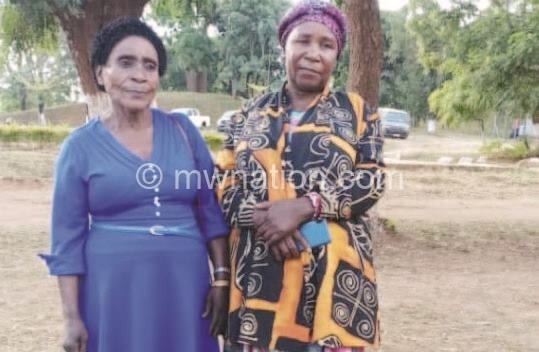‘Govt misled me on adoption’
Mary Sundwe, the Mchinji woman who fostered two siblings who went missing in government social welfare system for 23 years, claims at the point of adopting the children she was told that their parents could not be traced.
In an interview with Nation on Sunday from her home in Mchinji last week, Sundwe confirmed fostering the children after she ‘adopted’ them with the help of the two social welfare officers.

“By then I was chairing the village development committee. During our meetings, there were issues of vulnerable children which caught my attention. I consulted my husband who agreed that adopt some,” she said
She added: “I personally went to the social welfare office to express my interest and I told them I needed one child. Days later, I was called that there are some children but they are related and that they can’t be separated and this left me with no choice but adopted both of them,” said Sundwe.
She added that on several occasions, she had been visiting the office of social welfare in Mchinji to follow up on the biological parents to the children but said she was being told to take care of the children as their parents could not be traced and that was why she decided to change the boys’ names.
The issue about the missing of the two boys came to light after their biological mother Margret Bwanali reported the matter to the Ombudsman’s office after she noted that she was getting no joy on her search for them.
A week after the issue was reported to her office, the Ombudsman Martha Chizuma instituted an investigation which led to the discovery of the children at Sundwe’s house in Mchinji, contrary to the claim by the social welfare officers that they were at an orphanage.
Chizuma faulted the government social welfare system, saying in normal circumstances, the adoption should have been supported by a court order.
She said there is need for public officers to avoid taking short-cuts when handling such matters, considering that “we are dealing with human beings and not wild animals”.
“It is by God’s grace that these children have been discovered, but imagine how many children have disappeared from their biological parents in this manner,” she Chizuma.
She said due to lack of laws in the 1990s the guiding law on Children and Young Person’s Act, it was difficult for Bwanali to follow up on her children since they were not adopted through the courts.
Chizuma, however, said she was grateful to the foster Sundwe family which raised the boys to University level, saying since the children are now adults they are free to decide on their future.
In agreement with Chizuma, Bwanali said all she wanted to know was the truth about the whereabouts of her children and now that she know that they are alive, the choice is theirs on what to do in their lives. She, however, thanked Sundwe, whom she referred to as her sister, for her motherly love in upbringing the two siblings.
Mchinji District social welfare officer, a Mr. Chunga, said in a telephone interview that the search for the two boys was complicated by lack of documentation.
“We cannot still be faulting the process, what remains now, is to work together in healing the wounds,” said Chunga.
On her part, Sundwe is asking well-wishers to help one of the boys, who is a fresh graduate from Bunda College, secure employment so that he can build his future.
Adoption is legal in Malawi provided proper procedures are followed. The case of the Bwanali children was unique in that while the biological mother was in agony over the whereabouts of her children on one side, on the other side there was a selfless woman who loved he children she ‘adopted’ unprocedurally, though, because those who were supposed to help her adopt the children properly took short-cuts, and probably lied to her for reasons best known to themselves.
But, certainly, this case should act as a wake-up call to all stakeholders in circumstances where adoption is desirable. As the Ombudsman warns, “we should not relax, thinking that all is well out there”.





